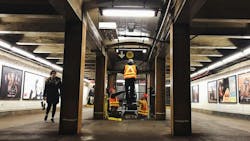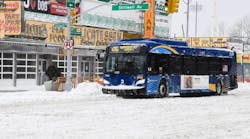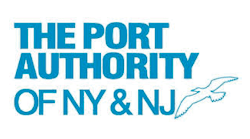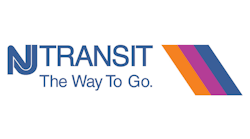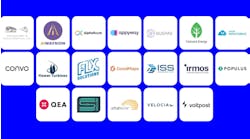Transit Tech Lab reveals winners of 2023 competition
The Transit Tech Lab has revealed the 13 winners of the 2023 annual competition, which was focused on Human Capital and Operational Efficiency. The winning companies have each completed successful eight-week proof-of-concept collaborations with participating agencies and will now move on to deploy their technologies through larger-scale pilot programs.
The participating transit agencies, which include the Metropolitan Transportation Authority (MTA), the Port Authority of New York and New Jersey (PANYNJ) and New Jersey Transit (NJ Transit), aim to leverage emerging technologies, including LiDAR, artificial intelligence and IoT to mitigate service disruptions, automate operations and combat workforce shortages.
The Operational Efficiency and Human Capital Challenges were launched in January 2023 and solicited nearly 150 applicants from across the world. Select companies then completed proofs of concept with the partner agencies. The 13 pilot winners, which were evaluated and selected by a team of transit and human capital experts, include:
Human Capital Challenge Pilot winners:
- eSkill Corporation (North Chelmsford, Mass.) - Provides a Talent Assessment Platform, including an online skills testing library and a remote proctoring solution, to easily evaluate job candidates through a fully configurable online platform. Partner agencies include the MTA and PANYNJ.
- Jetdocs (Ontario, Canada) - Provides a centralized catalog for users to submit tickets, requests and approvals, enabling easy standardization of processes to streamline workflows and enhance internal collaboration. Partner agency is the MTA.
- PyxAI (Boston, Mass.) - Provides a virtual, AI-enabled assessment platform that evaluates and collects data on people skills (e.g., communication, problem solving, adaptability, etc.) to help organizations identify hidden talent, improve retention rates and future-proof their workforce. Partner agency is the PANYNJ.
Operational Efficiency Challenge Pilot winners:
- ACCURE Battery Intelligence (USA and Germany) - Provides a predictive battery analytics platform that uses AI and machine learning to improve safety, enhance performance and extend the life of energy storage and Electric Vehicle (EV) assets. Partner agency is MTA’s New York City (NYC) Transit.
- Digital Mortar (San Rafael, Calif.) - Utilizes passenger flow sensors to provide real-time customer journey analytics for queue management, dynamic labor allocation, lost revenue analysis and space planning and commercial real-estate optimization. Partner agency is NJ Transit.
- Humatics (Waltham, Mass.) - Enables revenue service rolling stock to provide near real-time monitoring of track conditions with precise positioning of track anomalies for improved maintenance operations. Partner agency is NJ Transit.
- Lux Modus (Calgary, Canada) - Uses LiDAR and imagery fusion technology to automate 3D mapping to optimize asset management on critical transit infrastructure. Partner agencies include NJ Transit and MTA’s NYC Transit, Metro-North Railroad and Long Island Rail Road (LIRR).
- Signapse AI (Guildford, United Kingdom) - Utilizes AI to automatically translate written text to sign language enabling scalable, faster and more cost-effective accessible content for the deaf community. Partner agency is the PANYNJ.
- Swiftly Inc. (San Francisco, Calif.) - Provides the industry’s leading transit data platform for agencies to share real-time passenger information, manage day-to-day operations and improve service performance. Partner agency is MTA’s NYC Transit.
- TekTracking (Fairport, N.Y.) - Offers a set of mobile applications designed to streamline the reporting process for track inspection and signal testing. TekTracking serves as a link between conventional Enterprise Asset Management Systems and specialized fields such as Track and Signal. Partner agency is the PANYNJ.
- Throughput Inc. (Palo Alto, Calif.) - Provides a rapid supply chain diagnostics software that enables immediate operational intervention, eliminating maintenance downtime caused by supply chain delays and unavailability of parts. Partner agencies include MTA’s Metro North Railroad and LIRR.
- Widesense (Berkeley, Calif.) - Provides full lifecycle fleet electrification software and services. WideSense's AI-powered toolchain optimizes fleet operators' performance from planning to dispatch to operations and maintenance. It reduces infrastructure costs, increases vehicle utilization and service reliability and enables EV fleet operations that are more cost-competitive than diesel fleets. Partner agency is NJ Transit.
- Wi-Tronix (Bolingbrook, Ill.) - An immersive, real-time IoT platform that is essential for railroads and transit systems to continuously improve operations, safety practices and service reliability; Wi-Tronix collects insights from onboard systems and enables remote visibility for customers to make decisions and respond to issues quickly and efficiently. Partner agencies include MTA’s Metro-North Railroad and PANYNJ.
Winners selected through the Transit Tech Lab are eligible for competitive funding from the New York State Energy Research and Development Authority (NYSERDA), which provides support for projects that demonstrate innovative transit-focused solutions that align with New York State’s clean transportation goals.
“Thanks to our partner agencies’ stewardship and our pilot winners’ cutting-edge technologies, we are proud to share that this is the largest Transit Tech Lab pilot class ever. We’re eager for New Yorkers to experience the advantages of their efforts, which will lead to a better experience for transit users through advancements in the critical areas of operational efficiency and human capital,” said Stacey Matlen, vice president of innovation at the Partnership for New York City.
“Transit Tech Lab and the companies awarded in this year's competition are advancing the innovative transportation solutions needed to counter climate change and lower carbon emissions through improved efficiency and transit management. NYSERDA is proud to partner with them on putting the latest technologies in place for New Yorkers to have healthier, safer and cleaner commutes,” said Adam Ruder, director of clean transportation at NYSERDA.
Since 2018, Transit Tech Lab has fielded more than 750 applicants, tested 51 technologies and facilitated eight commercial engagements. The Lab is currently soliciting applications for its newest class, which aims to help partner agencies enhance customer experience, resiliency and curb management. Applications for the 2024 class is due Feb. 28, 2024.
